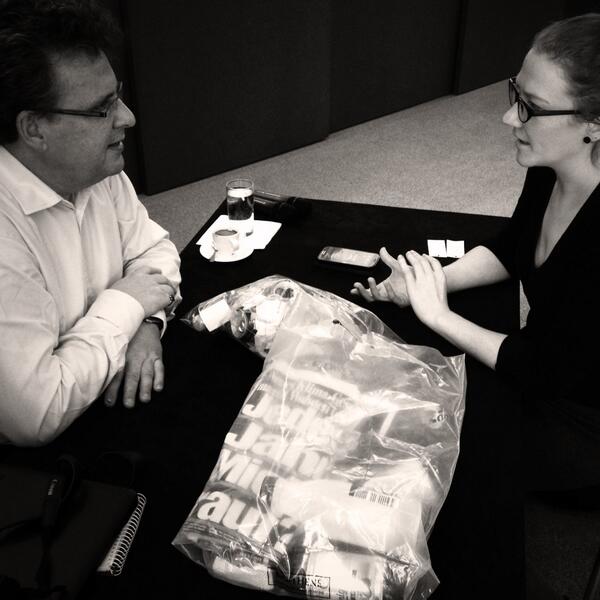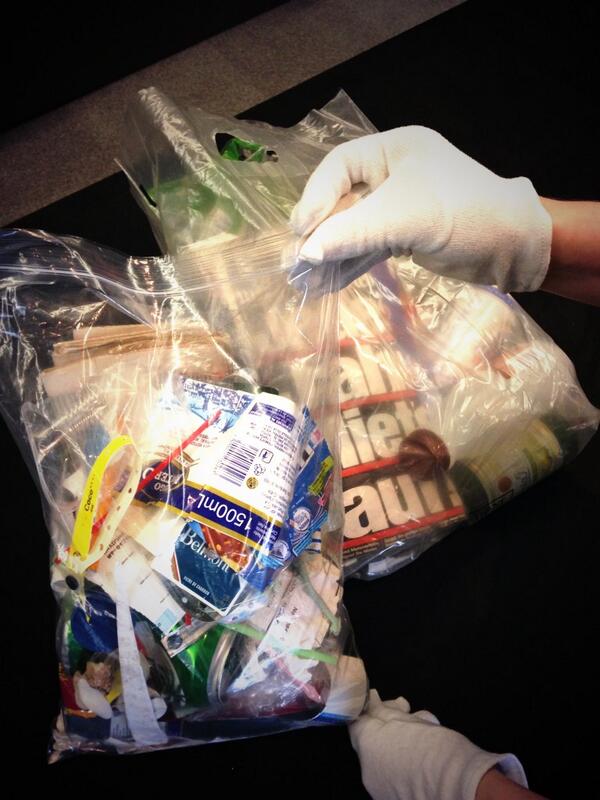Rubbish
Conversation with Lars Tharp at the Hepworth, Wakefield, 10/01/14.
The
Hepworth ran an #ICollect
this weekend
with Lars Tharp and the Museum of Contemporary Rubbish booked
onto the Sunday morning session:
WHAT
IS IT WORTH?:
“Ever
wondered if you're sitting on a small fortune? Bring in one or two
objects from your ceramics, glass or oriental goods collection to
learn more from BBC Antiques Roadshow expert, Lars Tharp.”
As
Wikipedia details:
“Wikipedia Lars Broholm Tharp is a Danish-born historian, lecturer
and broadcaster, and one of the longest running 'experts' on the BBC
antiques programme, Antiques
Roadshow,
first appearing in 1986. [..]
He studied Archaeology and Anthropology at Gonville and Caius
College, Cambridge University.”
Archaeology
is, essentially, studying
old
rubbish and you cannot study rubbish without studying anthropology to
some degree, so this was a great opportunity to pick Lars' brains
about value, worth and rubbish.
I
arrived at The Hepworth, booked in and took my ticket. The Hepworth
staff were bemused by my collections and seemed also keen to see what
Lars said about the value. The social media guy found me, got some
pictures and we had a chat about rubbish in art. He recalled a show
he'd seen at the Hayward last summer The
Alternative Guide to the Universe with Congolese 'Outsider'
artist Bodys Isek Kingelez who makes models of fantastical cities out
of cardboard and discarded materials. Another one for the compendium!
Whilst
I waited my turn in the room I'd previously curated Pecha Kucha Night
Wakefield in a couple of years ago, Lars talked to other collectors
about their pictures, glass ornamental vases and the like. People
were beginning to fill up the space and as my turn was called he
announced he would be speeding up the proceedings to fit everyone in.
The following 10 minutes of conversation are transcribed below:
 |
| Photo courtesy The Hepworth, Wakefield |
Lars
Tharp: You've brought in an installation. This is what I'd call an
installation.
Alice
Bradshaw: This is the Cuba Collection and this one is from Essen in
Germany.
LT:
How did these come about?
AB
This one [The Cuba Collection] was collected by myself whilst I was
over there on holiday and this one [The Essen Collection was sent
over by a musician friend as part of a Ruhr
Valley-Calder Valley exchange.
LT:
OK. This is the first time I've ever seen a collection like this.
This is basically someone's rubbish bin, isn't it?
AB:
Yes, this one [The Essen Collection] is, but this one [The Cuba
Collection] is from all over parts of Cuba; from Havana and the Cayo
Coco Islands.
LT:
This is the sort of thing that would have made it into the Opie
Collection. He specialises in packaging and the history of
packaging. His Museum used to be in Gloucester but now it's in London
in storage because it's so massive.
So
what you've brought is a time capsule. Is it just one person's
rubbish?
AB: No
it's multiple people's; found on the beach and on the street. But
this [The Essen Collection] is one person's rubbish and these are
just two collections from the entire Museum of Contemporary Rubbish.
LT:
What a great name! The Museum of Contemporary Rubbish. Where does
that hang out?
AB: It
exists online. Most of the Collections are recycled and there's only
a couple of Collections that still exist in physical form. I document
every single item and the blog features all the items and
Collections.
LT:
Now, what do you regard yourself as an anthropologist or as an
artist?
AB: As
an artist, but there's certainly an anthropological inclination to my
work.
LT:
I've got a couple of books back there on collecting and the theory of
collecting. I was reading a particular book yesterday; basically a
very Marxian approach to why we collect things and why we have to own
things – something I've given a lot of thought to over the years –
and I was struck by how much tosh there was in it! It's all very
convincing with lots of long words and pyschobabble but in the end
these are all assertions. This is not scientific. You cannot say that
because some collects this that they are anally retentive. I'm always
suspicious that the longer the sentence and the more complicated the
words the less the meaning there is. There I was eating my supper in
the hotel writing “RUBBISH!” Ha!
I
actually think this quite funny. Is this on exhibition somewhere?
AB: I
do exhibit the Museum yes; last year in Chicago and a solo show
coming up in Blackpool. I show them as the images. The only time I've
shown the actual rubbish was my own Hoard which was every item of
rubbish from my art practice that I collected during 2012.
LT:
What was the name of the artist that took all of his own stuff and he
shredded everything?
AB:
Michael Landy. Break Down (2001).
LT:
Yes. Which is the same sort of area isn't it?
AB:
Yes, definitely. I'm studying other artists' use of rubbish and he's
one of the more well known artists through media prominence. It was a
big statement to make. He destroyed absolutely everything he owned
including other artists' works he had collected.
LT:
It's fascinated stuff. Ordinary people reading the paper will say
“this is not good!” and actually there is some serious stuff in
there. I did archaeology so I've been specialising in rubbish! But of
course it acquires a different status once it's old there is that
sort of nostalgia what I call nostalgia effect.
AB:
And rarity too.
LT:
Yes. We could talk about that for ages but sadly we don't have time
today. I'll take a photo of this. I might use this because at the end
of the day I'm going to blast some images at 4-5 o'clock and I might
just show one or two things that came in and this has got to be in. …
I don't know what else I can say about this that you don't already
know.
AB:
I'd like to hear what you think of it's value.
LT:
You don't really want to know that?
AB: I
do. By the process you'd normally use to value objects..?
LT: Oh
that's easy. The process by which we do all the valuations works on
the basis that most of the objects brought in are comparable to
similar items. In the case of ceramics for example; ceramics are mass
produced essentially identical objects will appear over time with
little variants.
AB:
So, stuff like this [rubbish] is the extreme of that mass-production?
LT:
It's interesting; if you'd been in something like the Turner Prize
and this had been made by someone who had a name already as a
conceptual artist it would have a value which you could probably
gauge. The artist would have an agent which would already be tapping
into New York probably.. but what it's worth is what anyone is
prepared to pay for it. It's a really good question. I would say it's
worth, monetarily, in this present market, erm, it's probably worth
somewhere between nothing and nothing plus X.
AB:
Haha!
LT:
That's all I can say! But when you come back in five years time
having won the Turner Prize with one of these it'll have a value.
It's a question of finding people who are prepared to pay for it.
AB: So
I need someone to externally validate it?
LT:
The answer to your question is Tom
Sawyer by Mark Twain. Tom Sawyer was painting a fence as
punishment and all his chums come up the hillside and they say, “Ha
ha ha! You were made to paint the fence!” And Tom says, “You
haven't been asked to paint the fence have you?” Tom's making them
feel jealous about this painting the fence and in the end they're
desperate to paint the fence, which is a punishment basically, and
Tom says “What are you going to give me if I let you paint the
fence?” And so they end up taking coins out of their pockets and
bits of orange peel and all the sorts of things that school boys have
in their pockets in Mississippi in 1880. Gradually he's building up
this treasure trove of rubbish and they're all objects that they've
given up because they want to paint the fence. He's turned the fence
painting from a punishment into something desirable and it's
transacted with the stuff they have in their pockets. That's the only
answer I can give! It's worth a painted fence!
AB:
Great! Thank you very much.
 |
| Photo courtesy The Hepworth, Wakefield |
No comments:
Post a Comment